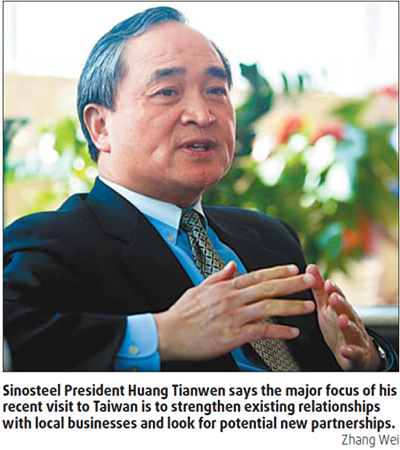
For Sinosteel Corp President Huang Tianwen, traveling to Taiwan for business has become easier in the past year.
"Significant changes have taken place in the past year concerning our relationships across the straits," Huang said.
Huang compared a trip to Taiwan in 2007 with his latest trip to the island in May.
On the trip in 2007, he said he spent three hours on a flight to Hong Kong, three hours applying for documents to enter Taiwan and another two hours for a flight to the island.
On this year's trip, Huang left Beijing in the morning and was meeting with friends and business partners in Taipei by lunchtime following a three-hour direct flight.
Huang's trip to Taiwan from May 6 to May 15 represented the first mainland business delegation to visit Taiwan following the April talks between Chen Yunlin, president of the Beijing-based Association for Relations Across the Taiwan Straits (ARATS), and Chiang Pin-king, chairman of the Taipei-based Straits Exchange Foundation (SEF).
In his first interview with the media since that trip, Huang told China Business Weekly that the Beijing delegation met with business leaders, industrial organization staff members and local government officials in Taiwan.
"The major focus of our visit was to strengthen existing relationships with local businesses and look for potential new partnerships," Huang said.
Sinosteel, China's largest state-owned steel trader, began doing business with companies in Taiwan long before other mainland companies entered the island's market.
But Sinosteel limited its involvement to certain sectors and worked mostly through subordinate companies.
The company's major partners in Taiwan are Chinasteel, Taiwan's leading steel maker, and E-United, an enterprise involved in steel, education and real estate sectors .
Huang described Taiwan as "a small island, but big market" for developing new business for his company.
Taiwan's steel makers have had to rely on imports, he said, but now are approaching businesses such as Sinosteel and related industries for supplies and also new business.
"We believe firms in Taiwan want to expand relationships because they can benefit from steady supplies and competitive prices, and also because they are looking for a bigger share in the mainland market," Huang said.
Sinosteel has set up a coordinating team in charge of all deals with Taiwan firms. A delegation will travel to Taiwan this summer, he said.
"Our trade volume with two major partners, E-United and Chinasteel, stood at $100 million last year. We are confident we can expand trade with Taiwan-based companies to $300 million to $500 million," Huang said.
During Huang's visit, he announced plans by Sinosteel to spend $1 million to build an office in Taipei's landmark Taipei 101 skyscraper.
"According to the media in Taiwan, building rents increased 20 percent after we said we would locate an office there," Huang said.
The 30-year business veteran said obstacles that remain in doing business with Taiwan include remaining government restrictions and also ambiguous policies on capital, taxation and tariffs.
However, Huang added that he is confident Taiwan will eliminate restrictions on trade and investments by mainland enterprises.
Attracting mainland investments to Taiwan "is expected to encourage trade flows and spur a recovery from the financial crisis," Huang said.
In fact, Huang foresees future partnerships that extend beyond the mainland and the island.
"We can join hands with companies in Taiwan for mutually beneficial projects in other countries," Huang said.
